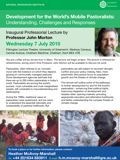
Pastoralists, often referred to as 'nomads', move with the livestock on which they depend, grazing on communally managed pastures. Some development agencies estimate that there are up to 200 million pastoralists in todays world. Pastoralists are among the world's poorest, most vulnerable and most marginalised people, still vulnerable to misunderstanding and stereotyping.
During the 1990s, traditional views of pastoralism were questioned, and we came to understand the essential rationality and sustainability of pastoral livelihoods. But pastoralists are still subject to recurrent drought, conflict and poor policy making. New, more pessimistic discussions focus on population growth and the threats of climate change.
This lecture will outline some of the pathways to further development by and for the world's pastoralists — enhancing their political rights, improving integration of development and disaster relief, opening markets, providing appropriate education and alternative livelihoods, and better understanding the complex threats of climate change.
This event has now taken place. Please download a copy of the presentation given by Professor John Morton.

